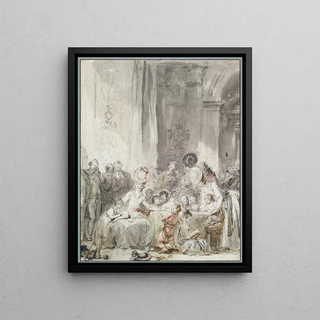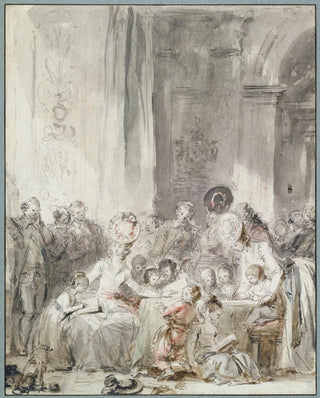Art print | La Compétition - Jean-Honoré Fragonard


View from behind

Frame (optional)
Art print La Competition - Jean-Honoré Fragonard – Engaging Introduction
The Competition, an iconic work by Jean-Honoré Fragonard, brilliantly embodies the essence of French rococo. This painting, both playful and dramatic, immerses the viewer in a universe where love and rivalry intertwine with apparent lightness. Fragonard, master of color and light, captures the fleeting moment of a court scene, where the characters seem to dance to the rhythm of an invisible melody. It is an invitation to explore the subtleties of human emotions through a composition that, while rich in detail, breathes grace and elegance. In this artwork, every brushstroke tells a story, every face expresses an intention, and every gesture carries meaning.
Style and uniqueness of the work
Fragonard's style is distinguished by its sensual approach and bold use of color. In La Competition, he deploys a vibrant palette that brings pastel shades to life, while playing with delicate shadows. The figures, though stylized, possess an expressiveness that transcends mere decoration. The characters, dressed in refined costumes, are frozen in a moment of palpable tension, where the rivalry for a beautiful's affection is at its peak. The composition, dynamic and almost kinetic, guides the viewer's eye across the canvas, revealing hidden details and subtle interactions. Fragonard thus manages to create an atmosphere that is both intimate and theatrical, where the viewer becomes a privileged witness to this romantic competition.
The artist and his influence
Jean-Honoré Fragonard, born in 1732, quickly established himself as one of the most influential artists of his time. Raised in the spirit of the Enlightenment, he drew inspiration from ideas of freedom and passion that pervade his century. His work, often considered lighthearted, carries a profound reflection on human relationships and social conventions. Fragonard was able to break free from the academic norms of his era by incorporating elements of daily life and sincere emotions into his compositions. His influence extends to

Matte finish

View from behind

Frame (optional)
Art print La Competition - Jean-Honoré Fragonard – Engaging Introduction
The Competition, an iconic work by Jean-Honoré Fragonard, brilliantly embodies the essence of French rococo. This painting, both playful and dramatic, immerses the viewer in a universe where love and rivalry intertwine with apparent lightness. Fragonard, master of color and light, captures the fleeting moment of a court scene, where the characters seem to dance to the rhythm of an invisible melody. It is an invitation to explore the subtleties of human emotions through a composition that, while rich in detail, breathes grace and elegance. In this artwork, every brushstroke tells a story, every face expresses an intention, and every gesture carries meaning.
Style and uniqueness of the work
Fragonard's style is distinguished by its sensual approach and bold use of color. In La Competition, he deploys a vibrant palette that brings pastel shades to life, while playing with delicate shadows. The figures, though stylized, possess an expressiveness that transcends mere decoration. The characters, dressed in refined costumes, are frozen in a moment of palpable tension, where the rivalry for a beautiful's affection is at its peak. The composition, dynamic and almost kinetic, guides the viewer's eye across the canvas, revealing hidden details and subtle interactions. Fragonard thus manages to create an atmosphere that is both intimate and theatrical, where the viewer becomes a privileged witness to this romantic competition.
The artist and his influence
Jean-Honoré Fragonard, born in 1732, quickly established himself as one of the most influential artists of his time. Raised in the spirit of the Enlightenment, he drew inspiration from ideas of freedom and passion that pervade his century. His work, often considered lighthearted, carries a profound reflection on human relationships and social conventions. Fragonard was able to break free from the academic norms of his era by incorporating elements of daily life and sincere emotions into his compositions. His influence extends to






